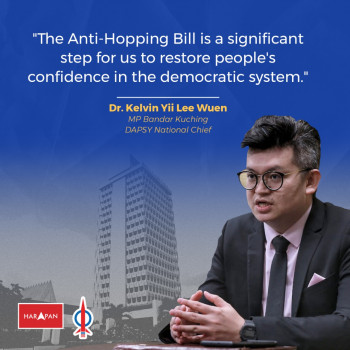A DAP lawmaker today criticised the apparent inability of Deputy Finance Minister Ahmad Maslan to tell the difference between ‘black economy’ and the informal economy.
Kluang MP Liew Chin Tong in a statement said the Ahmad Maslan’s declaration that the Goods and Services Tax (GST) would eradicate the ‘black economy’ did not make any sense.
“This is one of the most absurd statements the bungling Deputy Minister has ever made, caused by gross lack of understanding,” Liew said.
Yesterday, Ahmad Maslan was reported as saying that the controversial GST would help reduce the black economy rate to 10 per cent from 30 per cent at present.
“This is one of the merits of the GST and I don’t understand why the opposition continues to advocate the Sales and Services Tax. This means they are protecting black economy, shielding tax evaders and defaulters,” Ahmad Maslan said.
Ahmad also said that according to the World Bank, black economy (untraceable, and hence untaxable, business dealings) amounted to 30 per cent of the gross domestic product.
“Ahmad Maslan either does not understand what the World Bank was talking about when it discussed the informal or shadow economy or he has never read about it at all.
“Black economy is something else that means illegal businesses and transactions. If 30 percent of what is transacted in Malaysia are illegal, as alleged by Ahmad Maslan, then something is entirely rotten with the Malaysian legal system. How could the authorities sit back and do nothing if all these transactions are illegal?” Liew said.
“What the World Bank meant in its Malaysia Economic Monitor Report is that substantial numbers of Malaysian households breadwinners are working in the “informal sector” – this could refer to hawkers, small traders, casual workers and other types of work which are not in the formal, that is, not taxable sector,” Liew added.
This could mean your makcik who sells nasi lemak by the roadside or the father of four who work as a part-time shopkeeper, Liew said.
He also pointed out that the 6 per cent GST rate would hit the informal sector the hardest, because now they will be subject to taxes and rising costs that will cut into their already meagre profits.
“We need leaders who understand economics and can propose viable solutions, or are at least able to read the various economic reports properly,” he said.
The GST implementation has been fraught with problems even until now, less than two months from its due date of April 1. Registration for this consumption-based tax has been less-than-encouraging, with many small-to-medium enterprises having a lot of difficulty dealing with increased costs.
– The Rocket




